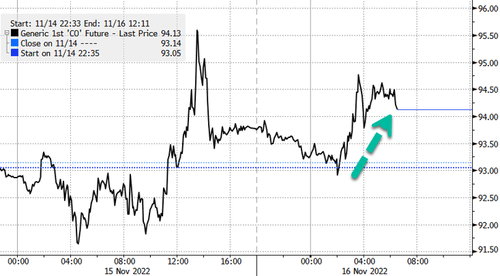Crude Prices Jump After Israeli Tanker Hit By Iranian Drone Off Oman Coast
Crude prices are higher Wednesday morning after a bomb-carrying drone on Tuesday evening struck an oil tanker owned by an Israeli billionaire, The Associated Press reported.
The Liberian-flagged oil tanker Pacific Zircon was approximately 150 miles off the Omani coast at 730 pm local time when a “projectile” hit the vessel, a Mideast-based defense official told AP. AP said the United Kingdom Maritime Trade Operations was notified about the attack and is monitoring shipping lanes in the region.
“We are aware of an incident and it’s being investigated at this time,” UKMTO said.
Also, the commander of the US Navy’s Fifth Fleet, Timothy Hawkins, was briefed on the incident, according to Reuters.
Brent crude prices, which were down before the news, jumped and traded above $94 a barrel.
In a statement, Pacific Zircon’s owner Eastern Pacific Shipping, which Israeli billionaire Idan Ofer owns, said the vessel was hauling diesel when it was “hit by a projectile … there were no reports of injuries or pollution.”
“All crew are safe and accounted for. There is some minor damage to the vessel’s hull but no spillage of cargo or water ingress,” the Singapore- based Eastern Pacific said.
Bloomberg cited a report via the Israeli Public Broadcasting Company (KAN) that said unidentified Israeli officials pointed the finger at Iran for the drone attack. Tracking data shows the vessel is off the Omani coast.
“While no one immediately claimed responsibility for the attack, suspicion immediately fell on Iran. Tehran and Israel have been engaged in a yearslong shadow war in the wider Middle East, with some drone attacks targeting Israeli-associated vessels traveling around the region,” AP noted.
Torbjorn Soltvedt, an analyst at the risk intelligence company Verisk Maplecroft, explained, “the risk of attacks against shipping and energy infrastructure in the wider region is rising mainly due to the lack of progress in U.S.-Iranian nuclear diplomacy and the decision by Washington to apply further sanctions pressure on Iran.”
Soltvedt continued: “Since 2019, Iran has consistently responded to new US sanctions with covert military action in the region.”
He added: “There is not just an increased risk of disruptive attacks against energy infrastructure in the region, but also a growing risk of a wider military confrontation with more serious consequences for world energy markets.”
Tyler Durden
Wed, 11/16/2022 – 07:26

